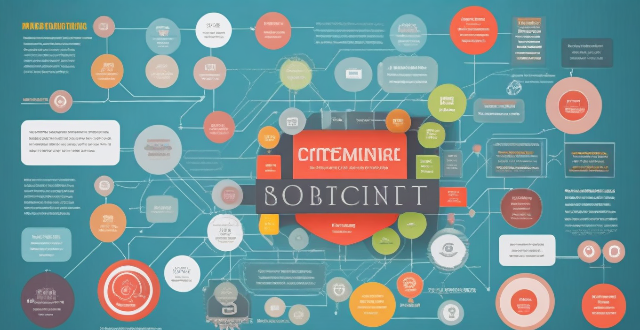Financial Transactions

Can blockchain technology revolutionize the financial industry ?
Blockchain technology has the potential to revolutionize the financial industry by introducing a decentralized, transparent, and secure way of conducting transactions. In this article, we will explore how blockchain technology can transform the financial sector and discuss its benefits and challenges. Benefits of Blockchain in Finance: - Decentralization: Elimination of intermediaries and increased efficiency. - Transparency: Immutable records and audit trail for regulatory compliance. - Security: Distributed ledger and cryptography ensure secure transactions. Challenges of Blockchain in Finance: - Regulatory uncertainty: Lack of clear regulations and compliance issues. - Scalability: Limited throughput and ongoing research for scaling solutions. - Interoperability: Integration with legacy systems and lack of standardization. Potential Use Cases for Blockchain in Finance: - Payments and Remittances: Faster and cheaper cross-border transactions. - Trade Finance: Streamlined processes and automated smart contracts. - Securities Settlement: Real-time settlement and fractional ownership of assets. In conclusion, blockchain technology has the potential to revolutionize the financial industry by introducing a decentralized, transparent, and secure way of conducting transactions. While there are challenges to overcome, such as regulatory uncertainty, scalability concerns, and interoperability issues, the benefits of blockchain in finance are undeniable. As the technology continues to evolve and mature, we can expect to see increased adoption and innovation in the financial sector powered by blockchain technology.

How can smart contracts be used to streamline financial transactions ?
Smart contracts can streamline financial transactions by automating processes, reducing costs, and increasing efficiency. They can automate payments and transfers, act as escrow services, create loan agreements, streamline insurance claims, and facilitate trading and exchanges of financial assets. As blockchain technology evolves, we can expect more innovative uses for smart contracts in the financial industry.

What is the role of blockchain in the financial industry ?
Blockchain technology has emerged as a game-changer in the financial industry, offering unprecedented levels of security, transparency, and efficiency. Its decentralized nature and immutable ledger system have paved the way for innovative applications that are reshaping the financial landscape. In this article, we will explore the various roles of blockchain in the financial industry. One of the key advantages of blockchain is its ability to create trust without the need for intermediaries. Traditional financial systems rely on central authorities, such as banks or clearinghouses, to verify and record transactions. With blockchain, transactions are verified by a network of nodes, each of which maintains a copy of the ledger. This decentralized approach eliminates the need for intermediaries, reducing costs and increasing efficiency. Blockchain provides a transparent and auditable ledger of all transactions. Each transaction is recorded on the blockchain in a tamper-resistant manner, ensuring that any attempt to alter the ledger will be immediately apparent. This level of transparency enhances accountability and reduces the risk of fraud or errors. Smart contracts are self-executing contracts with the terms of the agreement between buyer and seller being directly written into lines of code. These contracts can automatically execute transactions when certain conditions are met, eliminating the need for intermediaries and reducing the risk of non-performance or disputes. Smart contracts have the potential to revolutionize many areas of finance, including insurance, real estate, and supply chain management. Distributed ledger technology (DLT) is at the heart of blockchain's capabilities. It allows multiple parties to have access to a shared database that is secure, transparent, and tamper-proof. DLT enables faster settlement times, improved cash management, and reduced operational risks. It also facilitates cross-border payments and remittances, making them more efficient and cost-effective. Tokenization involves representing physical assets, such as stocks, bonds, or real estate, as digital tokens on a blockchain. This process enables fractional ownership, easier transferability, and increased liquidity. Tokenization also allows for programmable assets, where rules can be embedded into the tokens themselves, enabling automated compliance with regulations and contractual obligations. Blockchain can be used to create a secure and decentralized identity verification system. This system would allow individuals to control their own identity information and share it selectively with third parties while maintaining privacy. Such a system could significantly reduce identity fraud and streamline processes that require identity verification, such as opening bank accounts or applying for loans. Blockchain's transparency and immutability make it an ideal tool for regulatory compliance. By using blockchain to record all financial activities, regulators can easily monitor and analyze transactions in real-time, identifying potential violations and enforcing compliance more effectively. This could lead to more efficient regulation and better protection for consumers and investors. In conclusion, blockchain technology has the potential to transform the financial industry by improving efficiency, reducing costs, enhancing security, and promoting transparency. From decentralization and trust to smart contracts and tokenization, blockchain is poised to disrupt traditional financial models and create new opportunities for innovation and growth. As adoption continues to accelerate, we can expect to see even more exciting developments in the years ahead.

How do I ensure safe transactions when buying or selling second-hand goods online ?
When engaging in online transactions for second-hand goods, it is crucial to take precautions to ensure the safety and security of both parties involved. Here are some tips on how to do so: Research the Seller/Buyer: Check reviews and ratings, verify identity, and be cautious about sharing personal information. Use Secure Payment Methods: Avoid cash transactions, protect financial information, and opt for secure payment methods such as PayPal or credit cards. Meet in Public Places: Arrange for public meetings and bring a friend along for extra security. Inspect the Item Before Purchasing: Thoroughly inspect the item, ask questions, and ensure it matches the description provided by the seller. Keep Records of the Transaction: Save conversation history and request receipts or invoices to document the transaction.

How does digital identity verification work in online transactions ?
Digital Identity Verification in Online Transactions: A Comprehensive Guide Digital identity verification is a crucial aspect of online transactions, ensuring the authenticity and security of users. This process involves collecting personal information, verifying it against reliable sources, employing multi-factor authentication, using encryption techniques, and implementing monitoring systems to detect fraudulent activities. By following these steps, businesses can protect their customers' sensitive data and maintain trust in the digital marketplace.

How does Fintech drive innovation in the financial sector ?
Fintech is driving innovation in the financial sector by enhancing efficiency, democratizing access to services, improving customer experience, facilitating financial inclusion, enhancing security and compliance, and fostering innovation and collaboration.

How does Fintech impact financial inclusion ?
Fintech has revolutionized financial services, making them more accessible and affordable. It has increased accessibility for unbanked populations, lowered costs, improved efficiency, driven innovation, enhanced security, promoted financial literacy, facilitated inclusion initiatives, enabled digital identity verification, supported microfinance and crowdfunding, and promoted mobile money and payment systems. These advancements have significantly impacted financial inclusion worldwide.

How can governments encourage and improve financial literacy among citizens ?
Governments can encourage financial literacy by implementing education programs, offering accessible financial services, and enforcing consumer protection regulations. This will help citizens make informed decisions about their money, investments, and debts.

How does financial regulation differ across countries ?
Financial regulation is the process by which governments and other regulatory bodies oversee and control the financial sector. The objective of financial regulation is to ensure the stability of the financial system, protect consumers, promote fair competition, and prevent financial crimes. However, the way financial regulation is implemented varies significantly across countries due to differences in economic structures, legal systems, political ideologies, and cultural values. The legal and institutional framework for financial regulation differs widely among countries. Some countries have a centralized regulatory body that oversees all aspects of the financial sector, while others have multiple regulators responsible for different segments of the market. Capital requirements and risk management practices also vary across countries. In general, developed countries tend to have stricter capital requirements and more sophisticated risk management practices than emerging markets. Consumer protection and disclosure requirements are another area where financial regulation differs across countries. In some countries, such as the United States, there is a strong emphasis on protecting investors from fraudulent activities and ensuring transparency in financial transactions. Taxation policies and anti-money laundering (AML) regulations also play a role in shaping financial regulation across countries. Tax havens, for example, attract foreign investment by offering low tax rates and minimal regulatory oversight, which can lead to concerns about money laundering and tax evasion. Cultural and societal factors can influence financial regulation in various ways. For instance, trust in government institutions and the rule of law tends to be higher in countries with stronger democratic traditions, which may lead to greater acceptance of regulatory interventions. Conversely, countries with weaker institutions or a history of corruption may face challenges in implementing effective financial regulation. Additionally, social preferences regarding income inequality, environmental sustainability, and other issues can shape the priorities of financial regulators in different countries.

What are the main objectives of financial regulation ?
The main objectives of financial regulation are to promote stability, efficiency, and protect consumer interests in the financial sector. This involves preventing systemic risks, protecting depositors and investors, ensuring market integrity, encouraging competition, improving access to finance, facilitating innovation, ensuring fair treatment, providing education, and handling complaints. By achieving these goals, financial regulators help maintain a healthy and vibrant economy while safeguarding the interests of all stakeholders involved.

What is financial regulation ?
The text discusses the concept of financial regulation, which is a set of rules and guidelines that govern the operations of financial institutions. The primary objectives are to ensure stability and integrity of the financial system, promote fair dealing, protect consumers, and prevent financial crises. Key components include prudential regulation, market conduct regulation, consumer protection, systemic risk oversight, structural regulation, regulation of market infrastructure, and international coordination. Purposes of financial regulation are to ensure stability, promote transparency, protect consumers, facilitate efficiency, and prevent criminal activity. Methods of financial regulation include rulemaking, supervision, inspection, capital requirements, and liquidity requirements. Challenges in financial regulation include balancing oversight with innovation, keeping pace with technology, and international coordination.

Can I use Cross-Border Payment for personal transactions ?
Cross-border payment systems are designed to facilitate international transactions, allowing individuals and businesses to send and receive money across borders. These systems can be used for various purposes, including personal transactions. In this article, we will discuss the use of cross-border payment systems for personal transactions and provide some tips on how to make the most of them. Cross-border payment refers to the process of transferring money from one country to another. This can be done through various methods, such as wire transfers, credit cards, or digital wallets. The main purpose of cross-border payment systems is to simplify the process of sending and receiving money internationally, making it easier for people to conduct business or personal transactions with others around the world. While cross-border payment systems are primarily used for business transactions, they can also be used for personal transactions. Here are some examples of when you might use a cross-border payment system for personal transactions: Sending Money to Friends and Family Abroad: If you have friends or family members living in another country, you may need to send them money occasionally. Cross-border payment systems allow you to do this quickly and easily, without having to worry about exchange rates or bank fees. Paying for Online Shopping: Many online retailers offer international shipping, allowing you to purchase goods from other countries. When paying for these purchases, you can use a cross-border payment system to ensure that your payment is processed securely and efficiently. Travel Expenses: When traveling abroad, you may need to pay for expenses such as accommodation, transportation, or food. Cross-border payment systems can be useful in these situations, as they allow you to make payments in local currencies without having to carry large amounts of cash. To make the most of cross-border payment systems for personal transactions, consider the following tips: Choose the Right Provider: Not all cross-border payment systems are created equal. Some may offer better exchange rates or lower fees than others. Research different providers before choosing one to ensure that you get the best deal possible. Understand Fees and Exchange Rates: Before making any cross-border payment, be sure to understand the fees and exchange rates involved. Some providers may charge additional fees for certain types of transactions, so it's important to know what you're getting into before sending money. Keep Track of Your Transactions: When using cross-border payment systems for personal transactions, it's important to keep track of your transactions. This will help you stay organized and ensure that you don't overspend or lose track of your finances. Be Aware of Scams: Unfortunately, there are scammers who target people using cross-border payment systems. Be cautious when sharing personal information or sending money to someone you don't know well. If something seems suspicious, trust your instincts and report it to the appropriate authorities. In conclusion, cross-border payment systems can be a convenient and efficient way to handle personal transactions with people in other countries. By choosing the right provider, understanding fees and exchange rates, keeping track of your transactions, and being aware of potential scams, you can make the most of these systems and enjoy smoother international financial interactions.

How can women avoid falling victim to financial scams and fraud ?
Financial scams and fraud can target anyone, including women. To avoid falling victim to these schemes, it's crucial for women to educate themselves about common scams like phishing, romance, and investment frauds. Safe online habits, such as securing devices and being cautious with personal information, are also essential. Regularly monitoring finances, using credit cards wisely, building a support network of professionals and trusted friends or family, and reporting suspected fraud immediately are further protective measures. Staying informed and vigilant significantly reduces the risk of financial loss due to scams and fraud.

Is decentralized finance regulated by governments or financial institutions ?
The regulation of decentralized finance (DeFi) is a complex issue that involves both government and financial institutions. Governments can regulate DeFi indirectly through tax laws and anti-money laundering/know your customer (AML/KYC) laws, while also taking enforcement actions such as investigations, sanctions, and fines. Financial institutions may engage in self-regulation by establishing industry standards and best practices, building bridges with traditional finance, and offering insurance products tailored for DeFi risks. As the DeFi ecosystem continues to grow, it is likely that both government and financial institution regulation will continue to evolve.

How does cryptocurrency affect the global economy ?
The rise of cryptocurrency is having a significant impact on the global economy. Its decentralized nature challenges traditional monetary policy, increases financial inclusion for underserved populations, spurs innovation in the financial sector, and raises regulatory challenges. However, it also presents risks such as fraud and scams, as well as environmental concerns due to high energy consumption in mining.

What is a smart contract ?
Smart contracts are self-executing contracts with the terms of the agreement between buyer and seller being directly written into lines of code, which exist across a distributed, decentralized blockchain network. They allow for transactions and the transfer or distribution of cryptocurrencies to be executed automatically without the need for a central authority, legal system, or external enforcement mechanism. Smart contracts are autonomous, immutable, traceable, and decentralized. They have various use cases such as cryptocurrency transactions, insurance claims, supply chain management, real estate transactions, gambling and betting, and legal documents. The benefits of smart contracts include efficiency, transparency, security, speed, and accuracy. However, there are challenges and considerations such as code quality, lack of legal recognition, interoperability issues, and privacy concerns.

How do financial regulations prevent financial crises ?
Financial regulations help prevent crises by managing risks, promoting transparency, protecting consumers, maintaining market integrity, overseeing systemic risks, reducing moral hazard, and coordinating internationally.

How can I maintain my financial freedom once I achieve it ?
The text discusses strategies for maintaining financial freedom, including creating a budget and sticking to it, building an emergency fund, investing wisely, living below one's means, and continuously learning and growing. It emphasizes the importance of discipline, planning, and effort in sustaining financial independence.

What are the best practices for setting a personal budget ?
The article outlines best practices for setting a personal budget to achieve financial stability and success. It suggests determining income, listing expenses, setting financial goals, creating a budget plan, tracking spending, and adjusting the budget as needed.

What are the benefits of using Fintech solutions ?
The article discusses the benefits of using fintech solutions, which include improved efficiency and accessibility, greater security and transparency, and innovation and personalization. Fintech applications can streamline financial processes, reduce costs, and make financial services more accessible to a wider range of people. They also enhance data protection, use blockchain technology for secure transactions, and provide real-time tracking of transactions and account balances. Fintech solutions offer opportunities for innovation and personalization through AI and machine learning algorithms, robo-advisors, and gamification elements. Overall, fintech is revolutionizing the world of finance by making it more convenient, affordable, and enjoyable for everyone involved.

What is the impact of financial regulation on innovation in the financial sector ?
Financial regulation plays a critical role in the innovation landscape of the financial sector, with both positive and negative impacts. Positively, it promotes transparency and trust, encourages responsible innovation, and facilitates access to capital. However, it can also slow down the pace of innovation, restrict experimentation, and stifle international competitiveness. To mitigate these negative effects, adaptive regulation, collaborative approaches, and education and training are recommended. Striking a balance between fostering innovation and ensuring safety is crucial.

What is the relationship between financial regulation and financial stability ?
The relationship between financial regulation and financial stability is crucial for the proper functioning of the economy. Financial regulation, consisting of laws and guidelines, aims to ensure the safety and soundness of the financial system and protect consumers. Financial stability, on the other hand, refers to a condition where the financial system can withstand shocks without significant disruptions. Financial regulation affects financial stability in several ways: 1. It prevents financial fraud and misconduct by enforcing strict rules and penalties, maintaining public trust in the financial sector. 2. It promotes transparency and disclosure, allowing stakeholders to make informed decisions and enabling regulators to monitor the financial system effectively. 3. Regulators encourage sound risk management practices, such as capital requirements and stress testing, contributing to overall financial stability. 4. They maintain market integrity by promoting fair competition and preventing monopolistic behavior, ensuring confidence in the financial system. 5. Regulators address systemic risks through macroprudential policies, safeguarding against widespread financial instability. In conclusion, financial regulation plays a vital role in maintaining financial stability by preventing fraud, promoting transparency, encouraging sound risk management, maintaining market integrity, and addressing systemic risks. However, finding the right balance between regulation and innovation is crucial for achieving both regulatory effectiveness and financial stability.

What is the impact of financial regulation on global financial markets ?
Financial regulation is vital for maintaining stability and efficiency in global financial markets. It influences market stability by reducing volatility and preventing crises, improves risk management through enhanced transparency and control over high-risk practices, protects investors from fraud and unfair trading practices, and fosters innovation while ensuring safety and compliance. This balance is crucial for the health and growth of the global economy.

How do financial regulations impact banks and other financial institutions ?
Financial regulations are crucial for maintaining stability in the banking and financial sector. They protect depositors' interests, promote fair competition, prevent financial crises, and impact innovation and efficiency. Regulations like capital adequacy ratios, liquidity coverage ratios, and stress testing ensure depositors' safety. Antitrust laws and consumer protection laws encourage fair competition among banks. Prudential supervision and Basel III help prevent financial crises. However, excessive regulation may negatively affect innovation and profitability. Striking a balance between safety and promoting innovation is key.

How does Fintech contribute to reducing transaction costs ?
Fintech contributes to reducing transaction costs by streamlining processes, enhancing transparency, lowering fees and charges, and improving accessibility. It uses advanced technologies like AI and blockchain to automate processes, reduce errors and fraud, and increase trust among participants. Fintech companies often have lower overhead costs than traditional financial institutions, allowing them to offer services at a lower price point or even for free. They also reach underserved populations and provide them with financial services through online platforms or mobile devices. Overall, Fintech revolutionizes the way we handle financial transactions, making banking and other financial services more accessible, efficient, and cost-effective.

What role does financial literacy play in achieving wealth growth ?
Financial literacy is essential for wealth growth, encompassing budgeting, saving, investing, retirement planning, and credit management. By understanding these aspects, individuals can make informed financial decisions, reduce debt, build wealth, and achieve long-term financial stability.

In what ways does financial literacy affect personal finance management ?
Financial literacy is crucial for managing personal finances effectively, as it helps individuals understand basic financial concepts, promotes prudent budgeting and spending habits, shapes savvy saving and investing strategies, and facilitates efficient debt management.

What are the benefits of using decentralized finance ?
Decentralized finance (DeFi) is a sector within the cryptocurrency space that aims to create an open-source, permission-less, and transparent financial service ecosystem using blockchain technology. It offers several benefits over traditional financial systems, including increased accessibility, lower costs, greater transparency, enhanced security, programmable money, improved efficiency, and financial inclusion. By eliminating intermediaries and reducing overhead costs, DeFi makes financial services more affordable and accessible to a wider audience. Its transparent ledger system reduces fraud and increases trust among participants, while its secure blockchain networks protect user funds. DeFi also enables programmable money, allowing for customized financial products and services, and improves efficiency by streamlining transaction processing. Ultimately, DeFi has the potential to revolutionize finance by democratizing access to essential financial services for underbanked populations and bridging the gap between developed and developing countries in terms of financial access.

What is blockchain technology and how does it relate to cryptocurrency ?
Blockchain technology is a decentralized, distributedBlockchain technology is a decentralized, distributed transactions in a secure and im It is the foundational structure for cryptocurrencies, which are digital or virtual currencies that use cryptography for security and operate independently of a central bank. The key features of blockchain include decentralization, immutability, transparency, and security. Cryptocurrencies rely on blockchain technology to maintain a transparent and secure system for recording transactions without intermediaries like banks. Transactions are validated by network participants through consensus algorithms like Proof of Work (PoW) or Proof of Stake (PoS), and new coins can be issued as rewards for those who validate transactions and maintain the network. Overall, blockchain technology enables a peer-to-peer electronic cash system that is both secure and decentralized.

Can anyone achieve financial freedom ?
Financial freedom, a state where one's passive and active income covers living expenses without regular time-for-money exchanges, is a goal many strive for. Key factors for achieving it include education, saving habits, smart investing, debt management, multiple income streams, avoiding lifestyle inflation, long-term planning, and the right mindset. Actionable steps include budgeting, automated savings, early investing, continuous learning, and networking with like-minded individuals. While not everyone may achieve financial freedom due to varying circumstances, it is attainable for those who are committed and strategic in their approach.